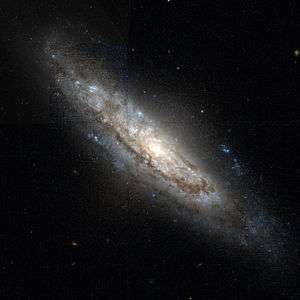NGC 2748
Coordinates: ![]() 09h 13m 43.0s, +76° 28′ 31″
09h 13m 43.0s, +76° 28′ 31″
| NGC 2748 | |
|---|---|
|
NGC 2748 imaged by the Hubble Space Telescope | |
| Observation data (J2000.0 epoch) | |
| Constellation | Camelopardalis |
| Right ascension | 09h 13m 43.0s[1] |
| Declination | +76° 28′ 31″[1] |
| Redshift | 0.004930[1] |
| Apparent magnitude (V) | 11.7[2] |
| Characteristics | |
| Type | Sbc[1] |
| Apparent size (V) | 2.250 × 0.720 arcmin[1] |
NGC 2748 is a 12th magnitude spiral galaxy in the constellation Camelopardalis.[3] It was discovered September 2, 1828 by John Herschel.[3] It likely contains a super-massive black hole.[4]
References
- 1 2 3 4 5 "NGC 2748". Simbad. Retrieved 7 July 2015.
- ↑ Frommert, Hartmut. "NGC 2748". SEDS. Archived from the original on 7 July 2015. Retrieved 7 July 2015.
- 1 2 Seligman, Courtney. "Celestial Atlas: NGC Objects: NGC 2700 - 2749". cseligman.com. Archived from the original on 7 July 2015. Retrieved 7 July 2015.
- ↑ http://arxiv.org/ftp/astro-ph/papers/0502/0502573.pdf
External links
- Images
- Spectral data
- Supermassive black hole mass measurements for NGC 1300 and NGC 2748 based on HST emission-line gas kinematics
This article is issued from Wikipedia - version of the 8/12/2015. The text is available under the Creative Commons Attribution/Share Alike but additional terms may apply for the media files.
